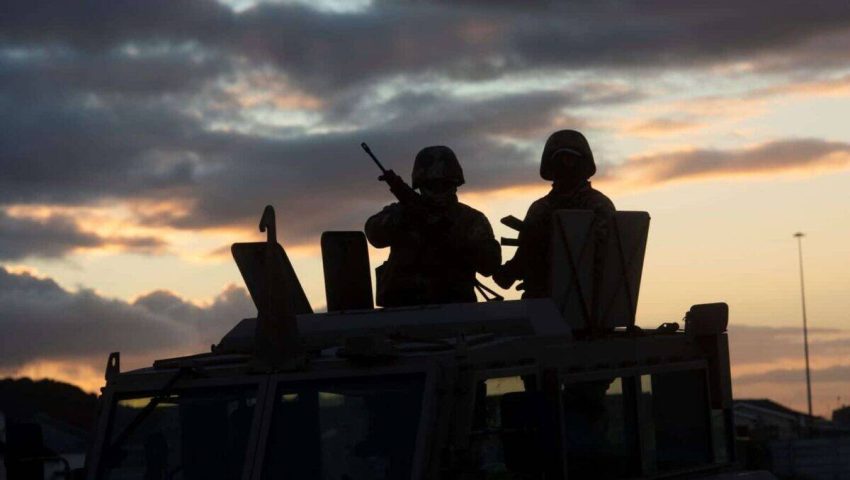Military experts downplay talk of a coup, but warn that poor governance and youth unemployment may lead to unrest.
There is no serious risk of a military coup d’etat in South Africa, but the country is sitting on a time bomb of anger – caused by poverty, inequality and joblessness – which could blow up into an insurrection, say experts.
Minister in the Presidency Khumbudzo Ntshavheni, who is also responsible for state security, said this week the State Security Agency and other relevant law enforcement agencies had identified “a potential risk of a coup d’état and put measures to prevent it”.
Ntshavheni’s coup d’etat red flag came just a week after KwaZulu-Natal police commissioner Lieutenant-General Nhlanhla Mkhwanazi, protected by heavily armed police officers, accused police management and other law enforcement agencies of colluding with criminals.
Military expert Helmoed-Römer Heitman did not believe there was a serious risk of a military coup in South Africa.
Heitman said the generals he might have doubts about were retired already.
“I also do not see many of our officers being taken with that idea,” he said. “But, of course, I do not have access to whatever intelligence she saw. There might be more risk among some of the corrupt former police generals, but I do not see the police as a coherent enough body for that.”
However, he added: “I can think of at least one political leader who might have delusions in that direction. But am not sure he would get the support of either the country’s defence force or the police, except perhaps a small number.”
He said there would be “greater risk in some sort of violent demonstrations being hijacked by a politician and that causing enough turmoil to trigger a state of emergency that could then itself be hijacked to force a change of leadership”.
Heitman believes that if action is taken against Mkhwanazi, there is a possibility of seeing an uprising similar to that which occurred when former president Jacob Zuma was arrested for contempt of court in 2021.
ALSO READ: Are we safe? Ntshavheni says security cluster detected potential risks of a coup [VIDEO]
“That seems possible, but I think it would be more peaceful. Generally, our youth unemployment, combined with poor service delivery and the failure to take any decisive action against corruption, are the biggest security threat that we face,” he said.
“If left unaddressed, that could lead to a revolt that could then be hijacked – by the very people who would make things worse because they do not understand how economies and countries work.”
When asked if South Africa’s political landscape allows space for a military takeover, he said: “Not as vulnerable because for all of its faults, the country does function and people can say what they think of the government.
“But that will not last if the economy, infrastructure and public service are allowed to continue crumbling and we do not act harshly against police who step out of line.”
Willem Els, an expert from the Institute for Security Studies (ISS), said it was not the first time a coup d’état threat was detected in South Africa.
“We previously saw Boeremag members attempting to do that and some of them were sentenced for high treason,” said Els.
“There was another attempt during the ANC conference in Bloemfontein [in 2012], where Zuma secured a second term as the party’s president, and it was foiled; people were arrested and sentenced. But we haven’t seen that from the left-wing spectrum up to now.”
He said the country should be worried because Ntshavheni flagged that possibility for a military takeover as “where there’s smoke, there must be a fire”.
He added for the fact that the matter was picked up and being attended to showed that there was something going on.
ALSO READ: ‘Where’s the proof?’: Calls for Ntshavheni to answer for coup claims
“So that is a reason for some concern, especially if you look at the state of intelligence agencies of our military, and also the police and our crime intelligence agencies. You know, all of them are really rock bottom,” said Els.
He said the other worrying factor was that South Africa’s military was being underfunded so they can’t even sustain themselves.
He doubted that should there be a coup d’etat, the country would be able to counter it.
He said there were other threats such as unemployment, poverty, inequality, poor service delivery, a shrinking black middle class, poor governance, crime and a trust deficit between government and the public and lawlessness.
Gareth Newham, head of justice and violence prevention at the ISS, said he thought Ntshavheni was “trying to raise the point that they can track groups that might try to undermine the state and the government”.
However, he added, “there is no political grouping that is causing an insurgency against the government or that wants to overthrow the state. South Africa is very different from other countries that usually experience coups because we have quite strong government systems in place”.
Newham does not believe the mention of the threat was a way of diverting attention from the allegations raised by Mkhwanazi.
Military expert Dean Wingrin said: “Traditionally, coups in Africa and other parts of the world have come from the military. South Africa has a long history of good civil/military relations, although some may say it has deteriorated in the last decade.
“Our military leadership is considered professional and it is difficult to see them revolting against the government or attempting a coup.”
NOW READ: Africa: seven coups in three years
